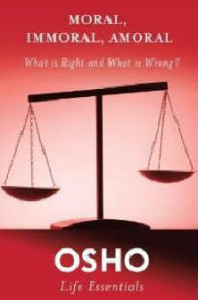What is Right and What is Wrong?

In a global world, we are in search of universal values—values based on a contemporary understanding that unifies us as human beings beyond the divisions of religions, nations, and race.
In Moral, Immoral, Amoral, Osho speaks directly to this contemporary search as he introduces us to a quest for values that make sense in the world we live in—a quest that goes far beyond moral codes of behavior and comes from an inner connectivity and oneness with existence.
Osho’s Ten NON-COMMAMDMENTS
And you want to know if somebody asks you about my philosophical standpoint…. It is not going to be that easy, because I see man as a multi-dimensional being. You will be able to state it standing on one foot, there is no need for sentences, but you will have to state ten non-commandments.
The first: freedom.
The second: uniqueness of individuality.
The third: love.
The fourth: meditation.
The fifth: non-seriousness.
The sixth: playfulness.
The seventh: creativity.
The eighth: sensitivity.
The ninth: gratefulness.
Tenth: a feeling of the mysterious.
What is Right and What is Wrong?
Dit boek Moral Immoral Amoral maakt deel uit van de serie: Life Essentials
In deze tijd van verharding en veronachtzaming laait de discussie over de moraal regelmatig op.
 Osho geeft aan, dat het aankweken van moreel gedrag, overeenkomstig speciale codes, weinig zin heeft. Het is iets wat opgelegd wordt en blijft daarom
Osho geeft aan, dat het aankweken van moreel gedrag, overeenkomstig speciale codes, weinig zin heeft. Het is iets wat opgelegd wordt en blijft daarom
beperkt tot de buitenkant. De sleutel ligt in grotere bewustwording. Op basis daarvan zal het zoeken naar waarden die passen in de huidige wereld waarin we leven,
iets wezenlijks opleveren.
Osho werpt een bijzonder licht op: ‘Behandel een ander zoals jezelf behandeld wilt worden.’ Bij dit algemeen gangbare uitgangspunt wordt, aan de hand van een boeiend verhaal, door Osho een bijzondere kanttekening geplaatst.
Het boek Moral Immoral Amoral is verkrijgbaar in de Boekhandel.
Elektrische rijders: ‘Geef laadpaalklevers een boete’
 oplaad-paal verbonden staan met hun auto. Zo zijn ze de komende uren verzekerd van een gratis parkeerplaats, lijkt de logische conclusie te zijn.
oplaad-paal verbonden staan met hun auto. Zo zijn ze de komende uren verzekerd van een gratis parkeerplaats, lijkt de logische conclusie te zijn.beperkt tot de buitenkant. De sleutel ligt in grotere bewustwording. Op basis daarvan zal het zoeken naar waarden die passen in de huidige wereld waarin we leven,
iets wezenlijks opleveren.’
Impressie van Moral Immoral Amoral
Osho presents his 10 Non-Commandments
“I don’t say cultivate morality; I say become more conscious, and you will be moral. But that morality will have a totally different flavor to it. It will be spontaneous; it will not be ready-made.” Osho
In a global world, we are in search of universal values—values based on a contemporary understanding that unifies us as human beings beyond the divisions of religions, nations, and race. In Moral, Immoral, Amoral, Osho speaks directly to this contemporary search as he introduces us to a quest for values that make sense in the world we live in—a quest that goes far beyond moral codes of behavior and comes from an inner connectivity and oneness with existence.
Content of ‘Moral Immoral Amoral’:
Introduction
1 From Action to Awareness
2 The Roots of Corruption
3 Fighting with Shadows
4 To be Whole is to be Holy
Epilogue: One day a man met a rabbi…
Exerpt from the epilogue, of ‘Moral Immoral Amoral’ :
“One day a man met a rabbi on the street. In an attempt to torment him, he asked him to express the entire philosophy of Judaism while he stood on one foot.
The rabbi stood on one foot and said, “Do unto others as you would have them do unto you. That is the law — the rest is commentary.”
If I were to be met by a tormentor and asked to stand on one foot and explain in one sentence what your teaching is, would I be correct in saying that it is freedom from suppression?
It will not be so easy.
First, you don’t know the name of the rabbi. His name was Hillel. He is the most famous Jewish philosopher, and he certainly condensed the whole philosophy of Judaism into a single sentence.
The incident is true. He was asked to stand on one foot and answer in the shortest way what the essence of Judaism is. And what he said is beautiful, but not without flaw. He said: Do unto others what you would like to be done to you by them. This is the essential Judaism, the rest is commentary. All great scriptures of the Jews, the TORAH, the TALMUD… all are just commentaries on the single, small, seedlike statement: Do unto others what you would like to be done to you by them.
others what you would like to be done to you by them.
As far as Judaism is concerned, no Jewish thinker has raised any suspicion about it. Neither has any non-Jewish philosopher raised any question about it.
But I am more concerned with human reality than just with philosophical arguments.
And looking at human reality, the statement is not correct — because my taste and your taste may be different.
To do unto others what you would like to be done to you by them can be right only if everybody’s taste is the same. And that is not the case.
For example, somebody is a masochist; he likes to be beaten, he likes to be tortured. Now what should he do with you, torture you? According to the principle, he should beat you, he should torture you, because that’s what he wants you to do to him.
Perhaps Hillel or the Jewish philosophers were not aware that there are people who love to be tortured and there are people who love to torture.
It is the latest contemporary psychological insight that there are sadists who like to torture, and there are masochists who like to be tortured; hence, it is said that the best couple in the world is if by chance a sadist and a masochist get married. Then they are living in paradise, because one wants to be tortured and the other wants to torture. Both are enjoying.
But it is very difficult. No astrologer thinks about it, no parents think about it. In fact, whether somebody is a sadist or a masochist is not considered at all when people are thinking about marriage. Before you fall in love, remember the first basic inquiry: if you are a sadist, then find a masochist; if you are a masochist, find a sadist.
The best places to find such people are the offices of psychoanalysts. Just sit outside there; you will find all kinds of people.
But this statement will not be applicable.
And you want to know if somebody asks you about my philosophical standpoint…. It is not going to be that easy, because I see man as a multi-dimensional being. You will be able to state it standing on one foot, there is no need for sentences, but you will have to state ten non-commandments.
The first: freedom.
The second: uniqueness of individuality.
The third: love.
The fourth: meditation.
The fifth: non-seriousness.
The sixth: playfulness.
The seventh: creativity.
The eighth: sensitivity.
The ninth: gratefulness.
Tenth: a feeling of the mysterious.
These ten non-commandments constitute my basic attitude towards reality, towards man’s freedom from all kinds of spiritual slavery.” Moral Immoral Amoral, Osho